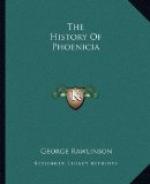If the Phoenicians are to be credited with acuteness of intellect, it must be limited to the field of practical enquiry and discovery. Whatever may be said with regard to the extent and variety of their literature—a subject which will be treated in another chapter—it cannot be pretended that humanity owes to them any important conquests of a scientific or philosophic character. Herodotus, who admires the learning of the Persians,[327] the science of the Babylonians,[328] and the combined learning and science of the Egyptians,[329] limits his commendation of the Phoenicians to their skill in navigation, in mechanics, and in works of art.[330] Had they made advances in the abstract, or even in the mixed, sciences, in mathematics, or astronomy, or geometry, in logic or metaphysics, either their writings would have been preserved, or at least the Greeks would have made acknowledgments of being indebted to them.[331] But it is only in the field of practical matters that any such acknowledgments are made. The Greeks allow themselves to have been indebted to the Phoenicians for alphabetic writing, for advances in metallurgy, for improvements in shipbuilding, and navigation, for much geographic knowledge, for exquisite dyes, and for the manufacture of glass. There can be no doubt that the Phoenicians were a people of great practical ability, with an intellect quick to devise means to ends, to scheme, contrive, and execute, and with a happy knack of perceiving what was practically valuable in the inventions of other nations, and of appropriating them to their own use, often with improvements upon the original idea. But they were not possessed of any great genius or originality. They were, on the whole, adapters rather than inventors. They owed their idea of alphabetic writing to the Accadians,[332] their weights and measures to Babylon,[333] their shipbuilding probably to Egypt,[334] their early architecture to the same country,[335] their mimetic art to Assyria, to Egypt, and to Greece. They were not poets, or painters, or sculptors, or great architects, much less philosophers or scientists; but in the practical arts, and even in the practical sciences, they held a high place, in almost all of them equalling, and in some exceeding, all their neighbours.




